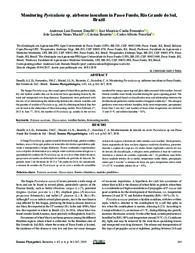Monitoring Pyricularia sp. airborne inoculum in Passo Fundo, Rio Grande do Sul, Brazil.
Monitoring Pyricularia sp. airborne inoculum in Passo Fundo, Rio Grande do Sul, Brazil.
Author(s): DANELLI, A. L. D.; FERNANDES, J. M. C.; MACIEL, J. L. N.; BOARETTO, C.; FORCELLINI, C. A.
Summary: The fungus Pyricularia sp., the causal agent of wheat blast, produces light, dry and hyaline conidia that can be removed from sporulating lesions by the wind and transported over long distances. Experiments were performed with the aim of (a) determining the relationship between the climate variables and the quantity of conidia of Pyricularia sp.,and (b) obtaining technical data that can be used in the elaboration of blast forecasting models.From February 2nd, 2013 to June 7th, 2014, the number of Pyricularia sp. conidia in the air was monitored by using a spore trap and glass slides smeared with vaseline. Several climate variables were hourly recorded during the spore capturing period. The data were explored based on classification trees and relationships between the weather-based predictors and the number of trapped conidia day-1. The strongest predictors were mean relative humidity, daily mean temperature, precipitation lower than 5 mm day-1,and number of hours when temperature was between 15 and 35 °C and relative humidity > 93%.
Publication year: 2019
Types of publication: Journal article
Unit: Embrapa Wheat
Keywords: Forecasting models, Oryza Sativa, Triticum Aestivum, Weather factors
Observation
Some of Embrapa's publications are published as ePub files. To read them, use or download one of the following free software options to your computer or mobile device. Android: Google Play Books; IOS: iBooks; Windows and Linux: Calibre.
Access other publications
Access the Agricultural Research Database (BDPA) to consult Embrapa's full library collection and records.
Visit Embrapa Bookstore to purchase books and other publications sold by Embrapa.

